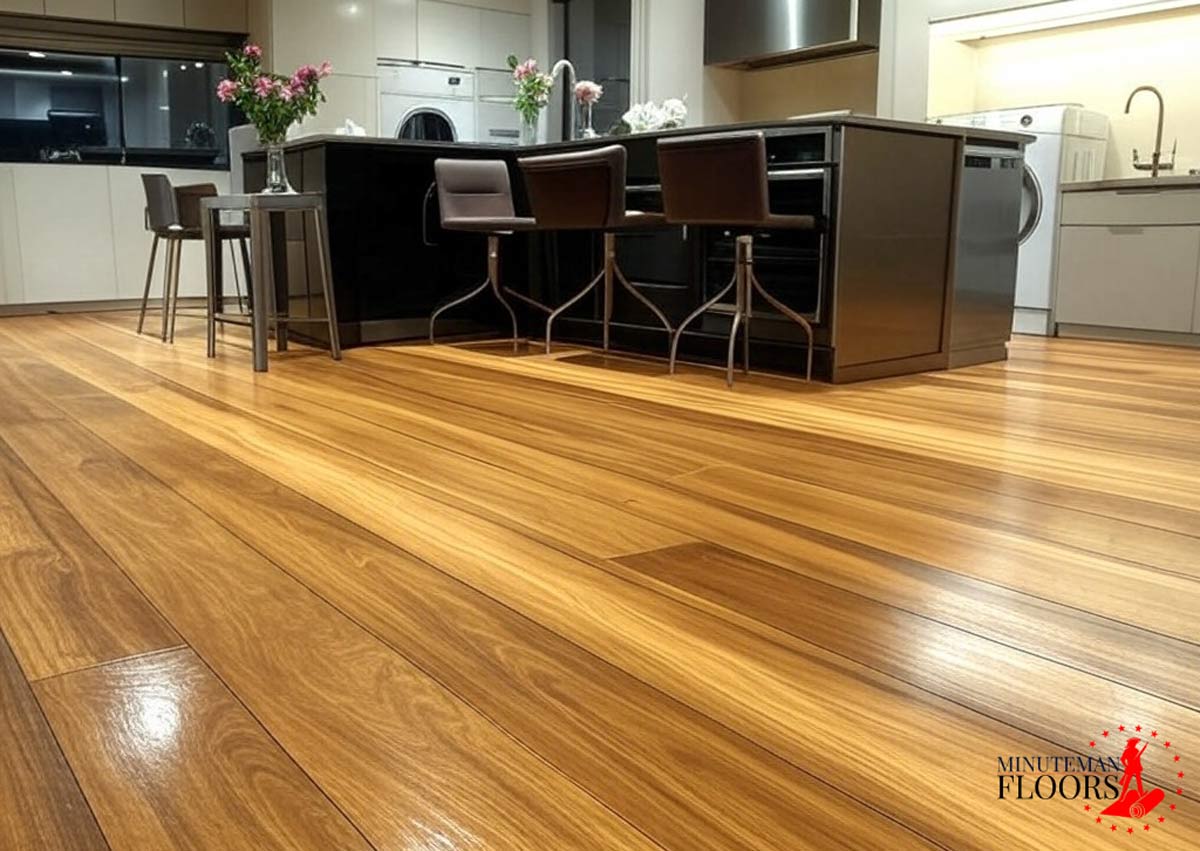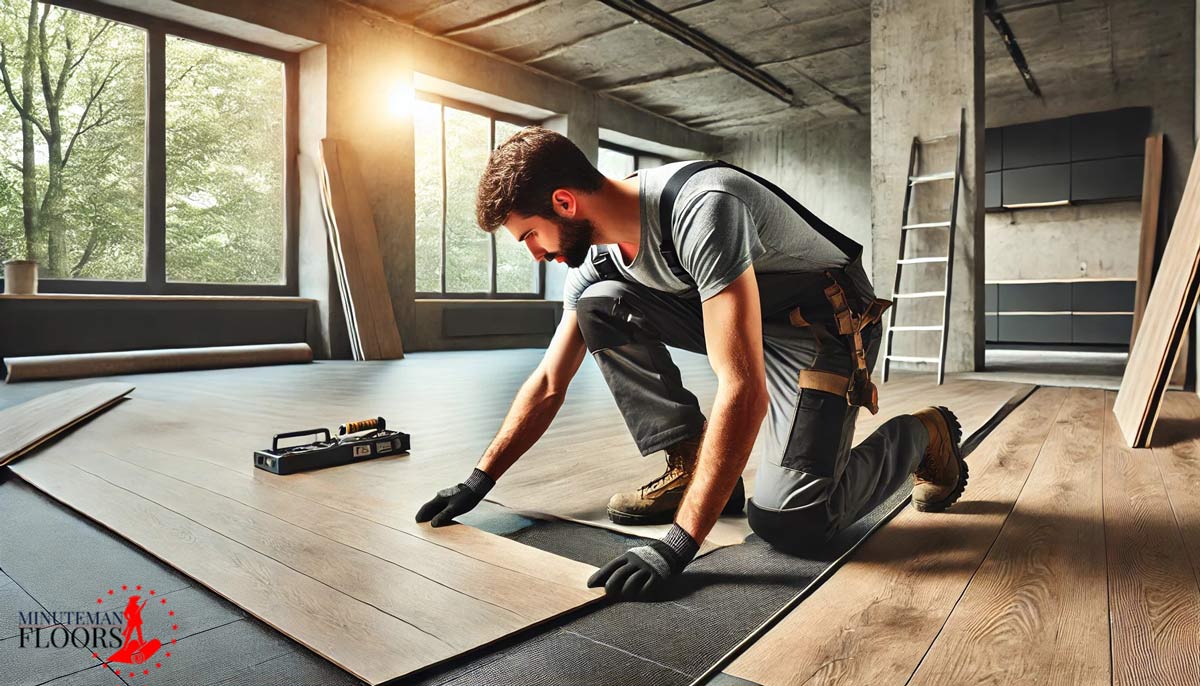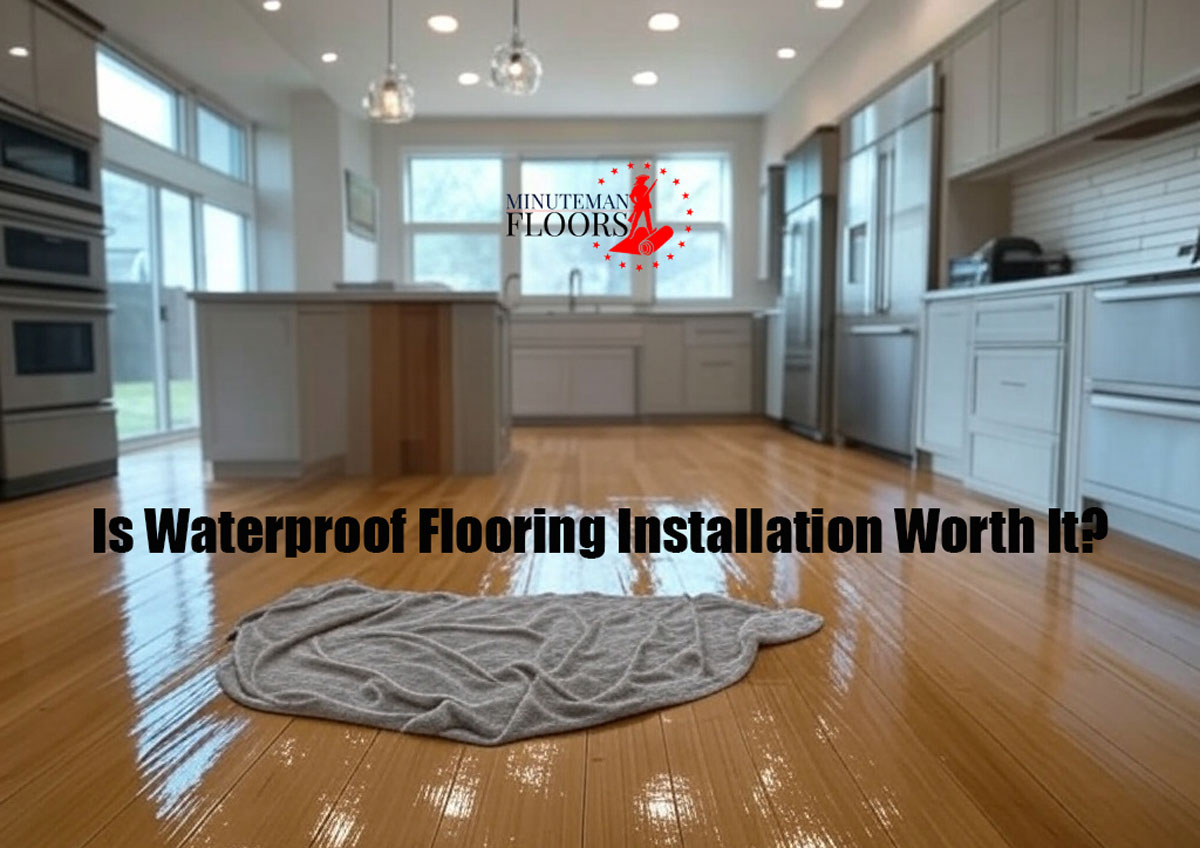Picture this: a spilled glass of juice in the kitchen, a muddy paw print parade after a rainy day, or a flooded basement after a New Hampshire snowmelt. For homeowners and businesses, these everyday mishaps can spell flooring disaster—unless you’ve got waterproof flooring on your side. At Minuteman Floors, we’ve seen it all, and one question keeps popping up: is waterproof flooring installation really worth it? In this comprehensive guide, we’ll break down everything you need to know about waterproof flooring—what it is, its benefits and drawbacks, how it stacks up cost-wise, and whether it’s the right fit for your space. By the end, you’ll have a clear answer tailored to your needs and budget.
Ready to upgrade your floors with expert waterproof flooring installation in Manchester, NH? Contact Minuteman Floors today! We bring top-notch service and flooring samples straight to your home or office for a hassle-free experience. Call now for a free consultation!
What Is Waterproof Flooring? A Deep Dive into the Basics
Before we weigh the pros and cons, let’s get a clear grasp of what waterproof flooring is and how it stands apart from options like water-resistant flooring.
Waterproof Flooring vs. Water-Resistant Flooring: What’s the Difference?
- Water-Resistant Flooring: Think of materials like engineered hardwood, bamboo, or certain laminates. These can handle light spills and humidity for a short time, but prolonged exposure leads to warping, mold, or rot. They’re best for low-risk spots like living rooms or bedrooms.
- Waterproof Flooring: This is the heavyweight champion of moisture protection. Designed to block water from penetrating its surface or core, it prevents damage even in the soggiest conditions. Its construction typically includes:
- A protective wear layer to fend off scratches, stains, and wear.
- A waterproof core made from materials like luxury vinyl, stone plastic composite (SPC), wood plastic composite (WPC), porcelain, ceramic, or specially treated waterproof laminate.
- Sealed edges to lock out moisture.
- An optional underlayment for insulation, comfort, and soundproofing.
This key difference makes waterproof flooring a standout for areas where water is a constant threat—think splashy kitchens, steamy bathrooms, or damp basements.
Why Waterproofing Matters
Water damage is a top culprit behind flooring failures. Industry studies estimate moisture-related repairs cost U.S. homeowners billions annually. In regions like New Hampshire, with its heavy snowfall and seasonal humidity, waterproof flooring installation can be a proactive shield for your investment. With this in mind, let’s explore the upsides and downsides of choosing this solution.
The Pros and Cons of Waterproof Flooring Installation
No flooring is perfect for every scenario. Here’s a detailed look at the advantages and potential pitfalls of waterproof flooring to guide your decision.
Benefits of Waterproof Flooring for Homes and Businesses
Unbeatable Water Protection
The hallmark of waterproof flooring is its ability to shrug off water without a hitch. It’s the go-to for high-humidity or spill-prone zones like kitchens, bathrooms, basements, laundry rooms, and mudrooms. No more fretting over warped planks or swollen tiles after a spill or flood.
Durability That Endures
Beyond water resistance, waterproof flooring is built tough. Its multi-layered design stands up to scratches, dents, stains, and heavy foot traffic—perfect for homes with rambunctious pets or kids, or bustling commercial spaces like retail shops and offices.
Hassle-Free Cleaning
Maintaining waterproof flooring is a snap—usually just a sweep or damp mop does the trick. Options like luxury vinyl even resist mold and mildew, a boon for allergy sufferers or anyone prioritizing indoor air quality.
Aesthetic Flexibility

Modern waterproof flooring doesn’t compromise on looks. Picture rich oak planks stretching across a cozy kitchen or sleek gray stone tiles lining a spa-inspired bathroom. [Image Placeholder: Side-by-side photos of a wood-look LVP kitchen and a ceramic tile bathroom, showcasing waterproof flooring styles.] From rustic farmhouse vibes to sleek contemporary designs, there’s a waterproof option for every taste.
Comfort and Insulation
Many types—like WPC vinyl or flooring with attached underlayments—feel softer and warmer underfoot than traditional tile. They also dampen sound and insulate, potentially lowering energy bills and creating a quieter space.
Eco-Friendly Options
Sustainability matters too. Many waterproof flooring types, like SPC and LVP, use recyclable materials or low-VOC finishes, reducing their environmental footprint. For green-minded homeowners, this adds extra value to your investment.
Drawbacks of Waterproof Flooring Installation
Higher Initial Cost
Quality has its price. Waterproof flooring often costs more than standard vinyl, laminate, or carpet, which can strain a tight budget.
No 100% Waterproof Solid Hardwood
Craving the look of real oak or maple? There’s no fully waterproof solid hardwood yet. While waterproof laminate and vinyl mimic wood beautifully, hardwood purists might feel shortchanged.
Installation Precision Is Key
Even top-tier waterproof flooring can falter if installed poorly. Gaps, uneven subfloors, or bad sealing can trap moisture underneath, causing subfloor damage or mold. Professional installation—like what Minuteman Floors provides—is critical.
Waterproof Flooring Cost vs. Long-Term Savings: A Closer Look
Cost often tips the scales in flooring decisions. Let’s dig into what you’ll pay upfront and how it pays off over time.
Breaking Down the Initial Costs
Here’s what popular waterproof flooring options might cost (per square foot, excluding installation):
- Porcelain and Ceramic Tiles: $5–$15. Skilled labor bumps installation to $3–$7 per square foot.
- Luxury Vinyl Planks (LVP) and Tiles (LVT): $3–$10. Simpler to install at $1–$3 per square foot.
- Stone Plastic Composite (SPC): $4–$12. DIY-friendly, but pros charge $2–$4 per square foot.
- Wood Plastic Composite (WPC): $4–$10. Softer than SPC, with installation at $2–$4.
- Waterproof Laminate: $2–$6. Budget-friendly, with installation at $1–$3.
For a 500-square-foot room, expect $1,500–$7,500 total, depending on material and job complexity. In Manchester, NH, these align with national labor averages.
Real-World Example: Kitchen Renovation
Imagine a 200-square-foot kitchen prone to spills. Standard laminate might cost $800 but fail in five years from water damage. Waterproof vinyl plank, at $1,200 upfront, lasts 20 years with minimal care. Over two decades, you’d dodge replacement costs, repairs, and headaches—proof the higher initial spend on waterproof flooring installation can be a savvy move.
Long-Term Savings and Value
Waterproof flooring excels in longevity and protection:
- Extended Lifespan: It lasts 10–50+ years, outpacing carpet (5–10 years) or standard laminate (8–15 years).
- Minimal Maintenance: No refinishing or deep cleaning—just basic upkeep keeps it fresh.
- Damage Prevention: It blocks water damage, saving you from subfloor repairs ($500–$2,000) or mold remediation ($1,000–$5,000).
- Boosted Resale Value: Durable, modern floors can fetch higher offers, adding thousands in a market like Manchester, NH.
For moisture-exposed spaces—like basements near the Merrimack River—waterproof flooring installation is a cost-effective defense against nature’s curveballs.
What to Expect During Waterproof Flooring Installation
Installing waterproof flooring isn’t just about choosing the right material—it’s about nailing the process. Here’s what ensures success:
- Subfloor Prep: A level, dry subfloor is non-negotiable. Uneven spots or trapped moisture can undermine even the best waterproof flooring.
- Proper Sealing: Tight seams and sealed edges block water. Pros use precision tools to eliminate gaps.
- Acclimation: Materials like vinyl or laminate need 24–48 hours to adjust to your home’s climate. Skipping this risks expansion or contraction later.
- Professional Touch: DIY is tempting, but experts—like Minuteman Floors—master tricky spots like corners or doorways for a flawless finish.
Curious about the process? Contact us for a free consultation, and we’ll walk you through every step!
Is Waterproof Flooring Installation Right for Your Space?

There’s no universal answer. Whether it’s worth it hinges on your lifestyle, location, and goals. Let’s break it down.
Ideal Scenarios for Waterproof Flooring
- Moisture-Prone Areas: Kitchens, bathrooms, basements, laundry rooms, and entryways are prime candidates. If you’ve faced a flooded basement after a New Hampshire snowmelt, you get the appeal.
- Active Households or Businesses: Pets tracking mud, kids spilling juice, or busy storefronts—waterproof flooring takes it in stride.
- Coastal or Wet Climates: Homes near water or in rainy, snowy regions (hello, New England winters!) gain extra peace of mind.
- Investment Mindset: Renovating to sell or staying long-term? Its durability and appeal make it future-proof.
When to Consider Alternatives
- Dry, Low-Risk Spaces: Bedrooms, home offices, or arid climates might not need waterproofing. Water-resistant options or carpet could save cash without compromising function.
- Limited Budget: If the upfront cost feels steep, traditional vinyl or laminate offers decent performance for less—though with less assurance.
Case Study: A Manchester Family’s Choice
Meet the Smiths, a lively family of five in Manchester, NH, with two kids, a golden retriever, and a basement that seemed cursed. In three years, they faced two floods—one from a burst pipe, another from a brutal snowmelt—leaving their carpet soaked and laminate warped beyond repair. Tired of cleanup chaos and repair bills, they turned to Minuteman Floors. We recommended SPC waterproof flooring for its rigid durability and sleek wood-look finish. The $3,000 installation transformed their basement into a playroom that could handle spills, muddy paws, and even a heavy spring rain two years later. While neighbors battled soggy floors, the Smiths’ basement stayed pristine, saving them at least $2,000 in repairs. For them, waterproof flooring installation wasn’t just worth it—it was a game-changer.
FAQs About Waterproof Flooring Installation
Here’s what our Minuteman Floors clients ask most often:
How Durable Is Waterproof Laminate Flooring?
Waterproof laminate resists water, scratches, and stains, lasting 10–20 years with care. It’s less rugged than SPC or tile, so it suits lighter-traffic areas like guest rooms.
Is Waterproof Vinyl Flooring Worth the Cost?
For spill-prone spaces, absolutely! Waterproof vinyl delivers durability, easy upkeep, and a 15–25-year lifespan—all cheaper than tile. It’s a sweet spot for budget-savvy reliability.
Is Waterproof Tile Flooring Better Than Vinyl Plank?
It’s a trade-off:
- Tile: Premium look, 20–50+ years, heat resistance—ideal for kitchens or bathrooms. But it’s pricier and less comfy.
- Vinyl Plank: Affordable, easy to install, softer underfoot—great for families or DIYers, though shorter-lived.
What Are the Best Waterproof Flooring Installation Options?
Top picks for durable waterproof flooring for kitchens, basements, and beyond include:
- Luxury Vinyl Plank (LVP) and Tile (LVT): Versatile and cost-effective.
- Stone Plastic Composite (SPC): Rigid and stable, even on uneven floors.
- Wood Plastic Composite (WPC): Cozy and quiet.
- Porcelain/Ceramic Tile: Long-lasting and elegant.
- Waterproof Laminate: Budget-friendly with solid performance.
Here’s a quick comparison:
|
Type |
Cost/Sq Ft |
Lifespan |
Best For |
Pros |
Cons |
|
LVP/LVT |
$3–$10 |
15–25 yrs |
Kitchens, living rooms |
Affordable, stylish |
Shorter lifespan |
|
SPC |
$4–$12 |
20–30 yrs |
Basements, uneven floors |
Rigid, durable |
Higher cost |
|
WPC |
$4–$10 |
15–25 yrs |
Bedrooms, offices |
Soft, quiet |
Less rigid than SPC |
|
Porcelain/Ceramic |
$5–$15 |
20–50+ yrs |
Bathrooms, kitchens |
Long-lasting, elegant |
Expensive, hard |
|
Waterproof Laminate |
$2–$6 |
10–20 yrs |
Guest rooms, low traffic |
Budget-friendly |
Less durable than tile |
Why Minuteman Floors Is Your Go-To for Waterproof Flooring Installation in Manchester, NH
Choosing the right flooring is half the battle—expert installation seals the deal. Here’s why we shine:
- Precision Installation: We lay every plank, tile, or sheet perfectly, preventing moisture woes.
- Convenience: We bring samples to you, saving time and tailoring advice to your space.
- One-Year Warranty: Our work comes with a full year of coverage for peace of mind.
- Local Expertise: Serving Manchester, NH, and beyond, we know the region’s climate challenges.
Ready to upgrade before the next spill or storm? Call Minuteman Floors at (603) 782-1942 or fill out our online form today to lock in your free consultation—don’t wait until it’s too late!
Final Thoughts: Is Waterproof Flooring Worth It?
Deciding on waterproof flooring installation boils down to your unique needs. If you’re tackling moisture, craving durability, or seeking a stylish, low-maintenance floor, its value is tough to beat. Yes, the upfront cost is higher, but the long-term savings, comfort, and resale boost often make it a winner—especially in Manchester, NH, where weather tests every floor’s mettle.
At Minuteman Floors, we’re here to guide you every step of the way. Contact us now to explore your options and start building a beautiful, worry-free floor that stands the test of time!

